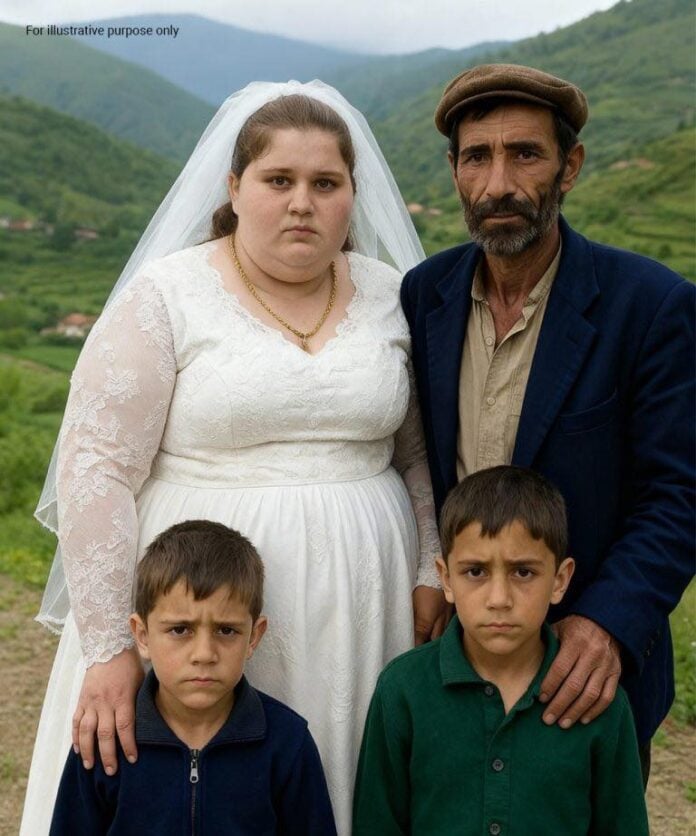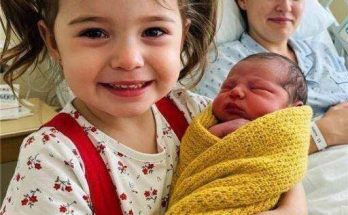At sixteen, Ellie’s life was not her own. She lived under the shadow of her father’s stern rule in a small town where gossip traveled faster than the wind. Shy, self-conscious, and struggling with her weight, Ellie often felt invisible—or worse, like an embarrassment to her family. Her father saw her not as a daughter to cherish, but as a burden to be dealt with.
Then, one afternoon, he announced a decision that shattered her world: Ellie was to marry Caleb, a rugged widower who lived deep in the mountains with his two young children. Twice her age, Caleb was a man she’d never met. Her father’s reasoning was cold and simple—Caleb needed a wife, and Ellie, he said, “needed a purpose.”
A Marriage She Never Wanted
The wedding came and went like a storm she couldn’t escape. Ellie stood trembling in a plain white dress while the townspeople whispered behind their hands. Caleb, tall and weathered by mountain life, said little. His two children, Mia and Ben, clung to his sides, their eyes wary and sad.
When Ellie arrived at the cabin that was now her “home,” she found it small and cold, surrounded by endless trees and silence. Caleb worked from dawn to dusk—hunting, chopping wood, and fixing what needed fixing. The children ignored her. She felt like an intruder in a stranger’s life.
Nights were the hardest. Alone by the flickering fire, Ellie cried quietly into her pillow, wondering if this lonely life was all she had to look forward to.
The Seeds of Change
Still, Ellie tried to reach out. She baked cookies and left little gifts—wildflowers, polished stones, carved sticks—for Mia and Ben. At first, they turned away. But Ellie remembered her own lonely childhood and refused to give up.
Slowly, small cracks began to appear in their walls. One cold afternoon, when Ellie was struggling to carry firewood, Caleb appeared beside her. Without a word, he lifted the load from her arms. “You don’t have to do it all alone,” he said quietly.
It was the first time he had spoken to her with kindness.
From that moment, something began to shift.
Finding Belonging
Life in the mountains was grueling. Every day demanded strength—hauling water, chopping wood, tending fires, and caring for two grieving children. But Ellie found a strange comfort in the rhythm of it. Her body grew stronger, her steps surer.
When little Mia fell ill one night, Ellie stayed awake by her bedside, cooling her fevered forehead with wet cloths. Caleb watched silently from the doorway. When morning came and Mia’s fever broke, the child whispered, “Thank you.”
For Ellie, that small word was everything.
Over the following weeks, laughter began to return to the cabin. Ben started asking her to read stories at night, and Mia began helping in the kitchen. Ellie discovered joy in caring for them—not because she had to, but because she wanted to.
The mountains, which once felt like a prison, were slowly becoming her refuge.
A Family Begins to Form
Caleb remained quiet, but Ellie started to see the man beneath the rough exterior—a man still mourning his late wife, Sarah, who had died giving birth to Ben.
One evening, as snow fell softly outside, they talked for the first time about their pain—his loss, her father’s cruelty, her struggle to see herself as worthy of love. For the first time, they laughed together.
Then one day, word came down from town. People were whispering again—calling her “the fat bride.” Old insecurities resurfaced, and she feared Caleb’s judgment.
Instead, he said, “They don’t know you, Ellie. I see how hard you work, how much you care for my children.”
Those simple words melted a piece of the shame she had carried for years.
Weathering the Storm
That winter, a fierce blizzard trapped the family inside the cabin. Food ran low, and the nights grew bitterly cold. Ellie rationed what little they had, always feeding the children first. Caleb noticed her quiet sacrifices and began teaching her how to hunt.
Her hands shook as she aimed the rifle for the first time, but his calm voice guided her. “You’re stronger than you think,” he said.
By spring, Ellie had transformed. She had lost weight naturally through her daily work, but the greater change was within. She was confident, capable, and no longer afraid.
The children now called her “Mama Ellie,” their laughter filling every corner of the once-lonely home. Even Caleb’s eyes softened when he looked at her.
Choosing Her Own Path
When Ellie’s father arrived one day, demanding she come back to town, she stood her ground. “This is my home now,” she said firmly. Caleb stood beside her, silent but proud.
For the first time in her life, Ellie spoke not from fear, but from strength.
Months later, at the village festival, Caleb took her hand in front of everyone. “You’ve made us a family again,” he said, kneeling before her with a simple ring. “Will you stay—not because you must, but because you want to?”
Tears filled her eyes as she whispered yes. The crowd erupted in applause, and Mia and Ben wrapped their arms around her.
That day, she wasn’t the frightened girl who had been forced into marriage. She was a woman who had chosen her own happiness.
A New Beginning
Years passed, and the cabin in the mountains became a warm, welcoming home. Ellie forgave her father before he died—not because he deserved it, but because she needed peace. The people who once mocked her now came seeking her advice, calling her “the mountain mother.”
Mia and Ben grew into strong, kind adults, and Ellie and Caleb’s love deepened with each passing season.
One evening, as they watched the sunset together, Mia—now nearly grown—asked, “Mama, how did you become so strong?”
Ellie smiled. “Because I had to,” she said softly. “But also because I learned to love myself along the way.”
The mountains that had once been her exile had become her freedom. Her father’s cruel decision had led her to the life she never knew she needed—a home, a family, and a love built not from duty, but from choice.
As she leaned against Caleb’s shoulder, Ellie whispered, “You’re home.”
And she truly was.



